Argumentative Essay: The Ethics of Artificial Intelligence Development
VerifiedAdded on 2022/09/18
|10
|2870
|84
Essay
AI Summary
This argumentative essay delves into the ethical considerations surrounding the development and implementation of artificial intelligence. It begins by defining AI and highlighting its potential benefits, such as increased efficiency and cost-effectiveness, while also acknowledging the risks, including job displacement and data misuse. The essay then explores the complexities of AI ethics, discussing different perspectives on ethical decision-making, including Kohlberg’s model of cognitive moral development and the principles of corporate social responsibility. It examines the ethical concerns related to AI, such as bias, cyber security, and the potential for malicious use. The essay further discusses the importance of establishing ethical guidelines, promoting transparency, and ensuring accountability in AI development. It concludes by emphasizing the need for global consensus and proactive measures to mitigate the risks associated with advanced AI, ensuring that its development benefits society and humanity.

Running Head: ARGUMENTATIVE ESSAY
Argumentative Essay
Name of the Student
Name of the University
Author Note
Argumentative Essay
Name of the Student
Name of the University
Author Note
Paraphrase This Document
Need a fresh take? Get an instant paraphrase of this document with our AI Paraphraser
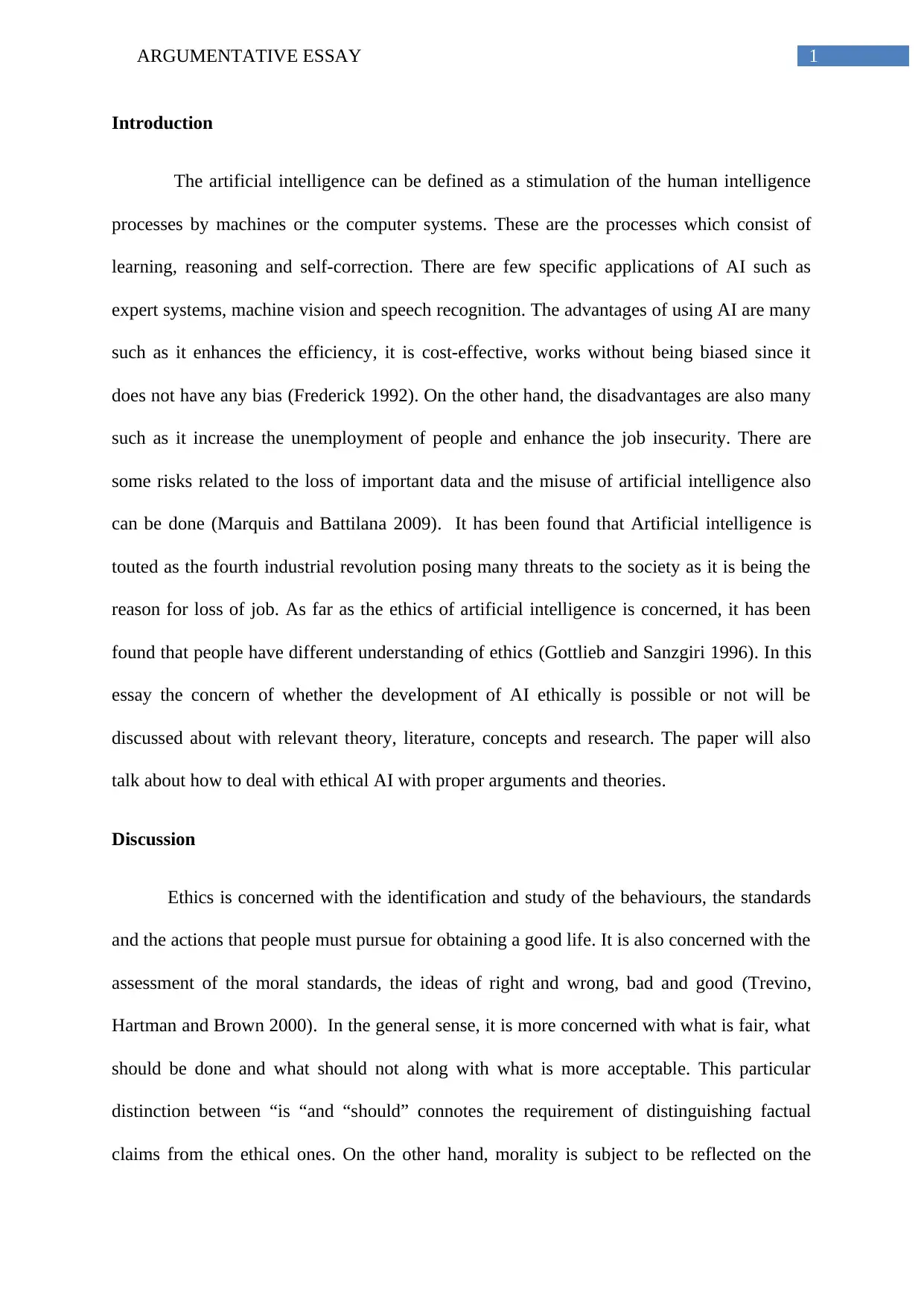
1ARGUMENTATIVE ESSAY
Introduction
The artificial intelligence can be defined as a stimulation of the human intelligence
processes by machines or the computer systems. These are the processes which consist of
learning, reasoning and self-correction. There are few specific applications of AI such as
expert systems, machine vision and speech recognition. The advantages of using AI are many
such as it enhances the efficiency, it is cost-effective, works without being biased since it
does not have any bias (Frederick 1992). On the other hand, the disadvantages are also many
such as it increase the unemployment of people and enhance the job insecurity. There are
some risks related to the loss of important data and the misuse of artificial intelligence also
can be done (Marquis and Battilana 2009). It has been found that Artificial intelligence is
touted as the fourth industrial revolution posing many threats to the society as it is being the
reason for loss of job. As far as the ethics of artificial intelligence is concerned, it has been
found that people have different understanding of ethics (Gottlieb and Sanzgiri 1996). In this
essay the concern of whether the development of AI ethically is possible or not will be
discussed about with relevant theory, literature, concepts and research. The paper will also
talk about how to deal with ethical AI with proper arguments and theories.
Discussion
Ethics is concerned with the identification and study of the behaviours, the standards
and the actions that people must pursue for obtaining a good life. It is also concerned with the
assessment of the moral standards, the ideas of right and wrong, bad and good (Trevino,
Hartman and Brown 2000). In the general sense, it is more concerned with what is fair, what
should be done and what should not along with what is more acceptable. This particular
distinction between “is “and “should” connotes the requirement of distinguishing factual
claims from the ethical ones. On the other hand, morality is subject to be reflected on the
Introduction
The artificial intelligence can be defined as a stimulation of the human intelligence
processes by machines or the computer systems. These are the processes which consist of
learning, reasoning and self-correction. There are few specific applications of AI such as
expert systems, machine vision and speech recognition. The advantages of using AI are many
such as it enhances the efficiency, it is cost-effective, works without being biased since it
does not have any bias (Frederick 1992). On the other hand, the disadvantages are also many
such as it increase the unemployment of people and enhance the job insecurity. There are
some risks related to the loss of important data and the misuse of artificial intelligence also
can be done (Marquis and Battilana 2009). It has been found that Artificial intelligence is
touted as the fourth industrial revolution posing many threats to the society as it is being the
reason for loss of job. As far as the ethics of artificial intelligence is concerned, it has been
found that people have different understanding of ethics (Gottlieb and Sanzgiri 1996). In this
essay the concern of whether the development of AI ethically is possible or not will be
discussed about with relevant theory, literature, concepts and research. The paper will also
talk about how to deal with ethical AI with proper arguments and theories.
Discussion
Ethics is concerned with the identification and study of the behaviours, the standards
and the actions that people must pursue for obtaining a good life. It is also concerned with the
assessment of the moral standards, the ideas of right and wrong, bad and good (Trevino,
Hartman and Brown 2000). In the general sense, it is more concerned with what is fair, what
should be done and what should not along with what is more acceptable. This particular
distinction between “is “and “should” connotes the requirement of distinguishing factual
claims from the ethical ones. On the other hand, morality is subject to be reflected on the
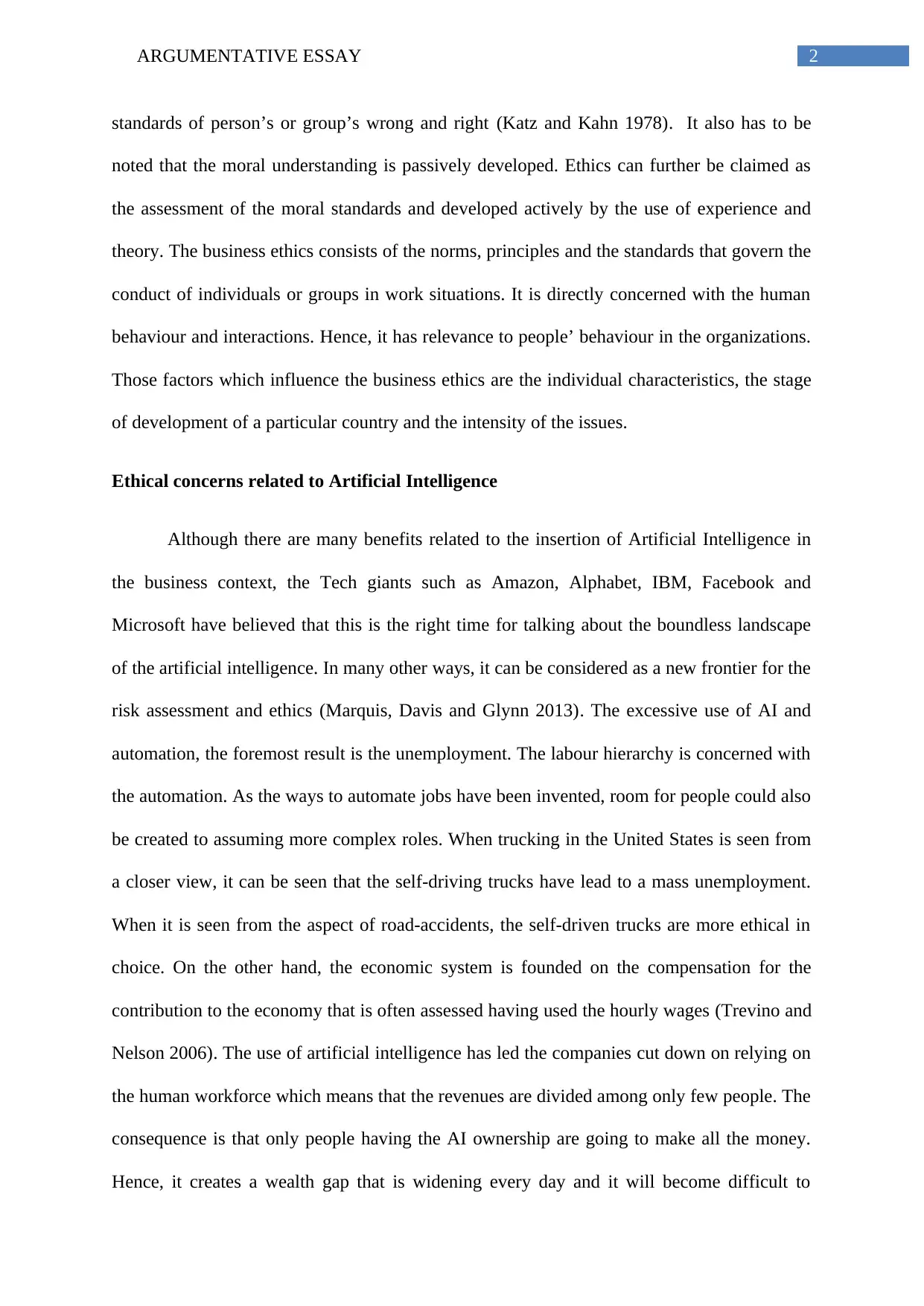
2ARGUMENTATIVE ESSAY
standards of person’s or group’s wrong and right (Katz and Kahn 1978). It also has to be
noted that the moral understanding is passively developed. Ethics can further be claimed as
the assessment of the moral standards and developed actively by the use of experience and
theory. The business ethics consists of the norms, principles and the standards that govern the
conduct of individuals or groups in work situations. It is directly concerned with the human
behaviour and interactions. Hence, it has relevance to people’ behaviour in the organizations.
Those factors which influence the business ethics are the individual characteristics, the stage
of development of a particular country and the intensity of the issues.
Ethical concerns related to Artificial Intelligence
Although there are many benefits related to the insertion of Artificial Intelligence in
the business context, the Tech giants such as Amazon, Alphabet, IBM, Facebook and
Microsoft have believed that this is the right time for talking about the boundless landscape
of the artificial intelligence. In many other ways, it can be considered as a new frontier for the
risk assessment and ethics (Marquis, Davis and Glynn 2013). The excessive use of AI and
automation, the foremost result is the unemployment. The labour hierarchy is concerned with
the automation. As the ways to automate jobs have been invented, room for people could also
be created to assuming more complex roles. When trucking in the United States is seen from
a closer view, it can be seen that the self-driving trucks have lead to a mass unemployment.
When it is seen from the aspect of road-accidents, the self-driven trucks are more ethical in
choice. On the other hand, the economic system is founded on the compensation for the
contribution to the economy that is often assessed having used the hourly wages (Trevino and
Nelson 2006). The use of artificial intelligence has led the companies cut down on relying on
the human workforce which means that the revenues are divided among only few people. The
consequence is that only people having the AI ownership are going to make all the money.
Hence, it creates a wealth gap that is widening every day and it will become difficult to
standards of person’s or group’s wrong and right (Katz and Kahn 1978). It also has to be
noted that the moral understanding is passively developed. Ethics can further be claimed as
the assessment of the moral standards and developed actively by the use of experience and
theory. The business ethics consists of the norms, principles and the standards that govern the
conduct of individuals or groups in work situations. It is directly concerned with the human
behaviour and interactions. Hence, it has relevance to people’ behaviour in the organizations.
Those factors which influence the business ethics are the individual characteristics, the stage
of development of a particular country and the intensity of the issues.
Ethical concerns related to Artificial Intelligence
Although there are many benefits related to the insertion of Artificial Intelligence in
the business context, the Tech giants such as Amazon, Alphabet, IBM, Facebook and
Microsoft have believed that this is the right time for talking about the boundless landscape
of the artificial intelligence. In many other ways, it can be considered as a new frontier for the
risk assessment and ethics (Marquis, Davis and Glynn 2013). The excessive use of AI and
automation, the foremost result is the unemployment. The labour hierarchy is concerned with
the automation. As the ways to automate jobs have been invented, room for people could also
be created to assuming more complex roles. When trucking in the United States is seen from
a closer view, it can be seen that the self-driving trucks have lead to a mass unemployment.
When it is seen from the aspect of road-accidents, the self-driven trucks are more ethical in
choice. On the other hand, the economic system is founded on the compensation for the
contribution to the economy that is often assessed having used the hourly wages (Trevino and
Nelson 2006). The use of artificial intelligence has led the companies cut down on relying on
the human workforce which means that the revenues are divided among only few people. The
consequence is that only people having the AI ownership are going to make all the money.
Hence, it creates a wealth gap that is widening every day and it will become difficult to
⊘ This is a preview!⊘
Do you want full access?
Subscribe today to unlock all pages.

Trusted by 1+ million students worldwide
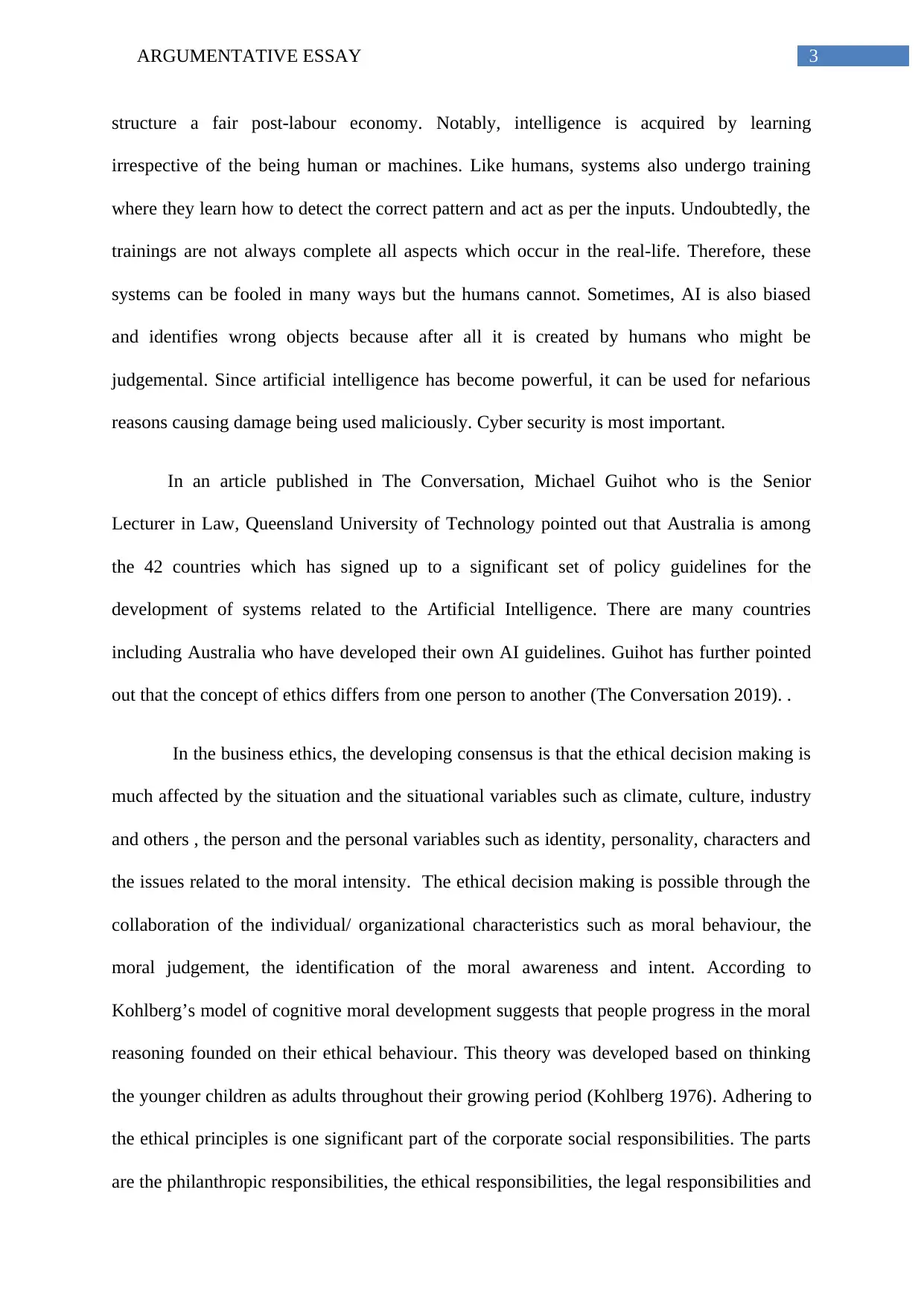
3ARGUMENTATIVE ESSAY
structure a fair post-labour economy. Notably, intelligence is acquired by learning
irrespective of the being human or machines. Like humans, systems also undergo training
where they learn how to detect the correct pattern and act as per the inputs. Undoubtedly, the
trainings are not always complete all aspects which occur in the real-life. Therefore, these
systems can be fooled in many ways but the humans cannot. Sometimes, AI is also biased
and identifies wrong objects because after all it is created by humans who might be
judgemental. Since artificial intelligence has become powerful, it can be used for nefarious
reasons causing damage being used maliciously. Cyber security is most important.
In an article published in The Conversation, Michael Guihot who is the Senior
Lecturer in Law, Queensland University of Technology pointed out that Australia is among
the 42 countries which has signed up to a significant set of policy guidelines for the
development of systems related to the Artificial Intelligence. There are many countries
including Australia who have developed their own AI guidelines. Guihot has further pointed
out that the concept of ethics differs from one person to another (The Conversation 2019). .
In the business ethics, the developing consensus is that the ethical decision making is
much affected by the situation and the situational variables such as climate, culture, industry
and others , the person and the personal variables such as identity, personality, characters and
the issues related to the moral intensity. The ethical decision making is possible through the
collaboration of the individual/ organizational characteristics such as moral behaviour, the
moral judgement, the identification of the moral awareness and intent. According to
Kohlberg’s model of cognitive moral development suggests that people progress in the moral
reasoning founded on their ethical behaviour. This theory was developed based on thinking
the younger children as adults throughout their growing period (Kohlberg 1976). Adhering to
the ethical principles is one significant part of the corporate social responsibilities. The parts
are the philanthropic responsibilities, the ethical responsibilities, the legal responsibilities and
structure a fair post-labour economy. Notably, intelligence is acquired by learning
irrespective of the being human or machines. Like humans, systems also undergo training
where they learn how to detect the correct pattern and act as per the inputs. Undoubtedly, the
trainings are not always complete all aspects which occur in the real-life. Therefore, these
systems can be fooled in many ways but the humans cannot. Sometimes, AI is also biased
and identifies wrong objects because after all it is created by humans who might be
judgemental. Since artificial intelligence has become powerful, it can be used for nefarious
reasons causing damage being used maliciously. Cyber security is most important.
In an article published in The Conversation, Michael Guihot who is the Senior
Lecturer in Law, Queensland University of Technology pointed out that Australia is among
the 42 countries which has signed up to a significant set of policy guidelines for the
development of systems related to the Artificial Intelligence. There are many countries
including Australia who have developed their own AI guidelines. Guihot has further pointed
out that the concept of ethics differs from one person to another (The Conversation 2019). .
In the business ethics, the developing consensus is that the ethical decision making is
much affected by the situation and the situational variables such as climate, culture, industry
and others , the person and the personal variables such as identity, personality, characters and
the issues related to the moral intensity. The ethical decision making is possible through the
collaboration of the individual/ organizational characteristics such as moral behaviour, the
moral judgement, the identification of the moral awareness and intent. According to
Kohlberg’s model of cognitive moral development suggests that people progress in the moral
reasoning founded on their ethical behaviour. This theory was developed based on thinking
the younger children as adults throughout their growing period (Kohlberg 1976). Adhering to
the ethical principles is one significant part of the corporate social responsibilities. The parts
are the philanthropic responsibilities, the ethical responsibilities, the legal responsibilities and
Paraphrase This Document
Need a fresh take? Get an instant paraphrase of this document with our AI Paraphraser
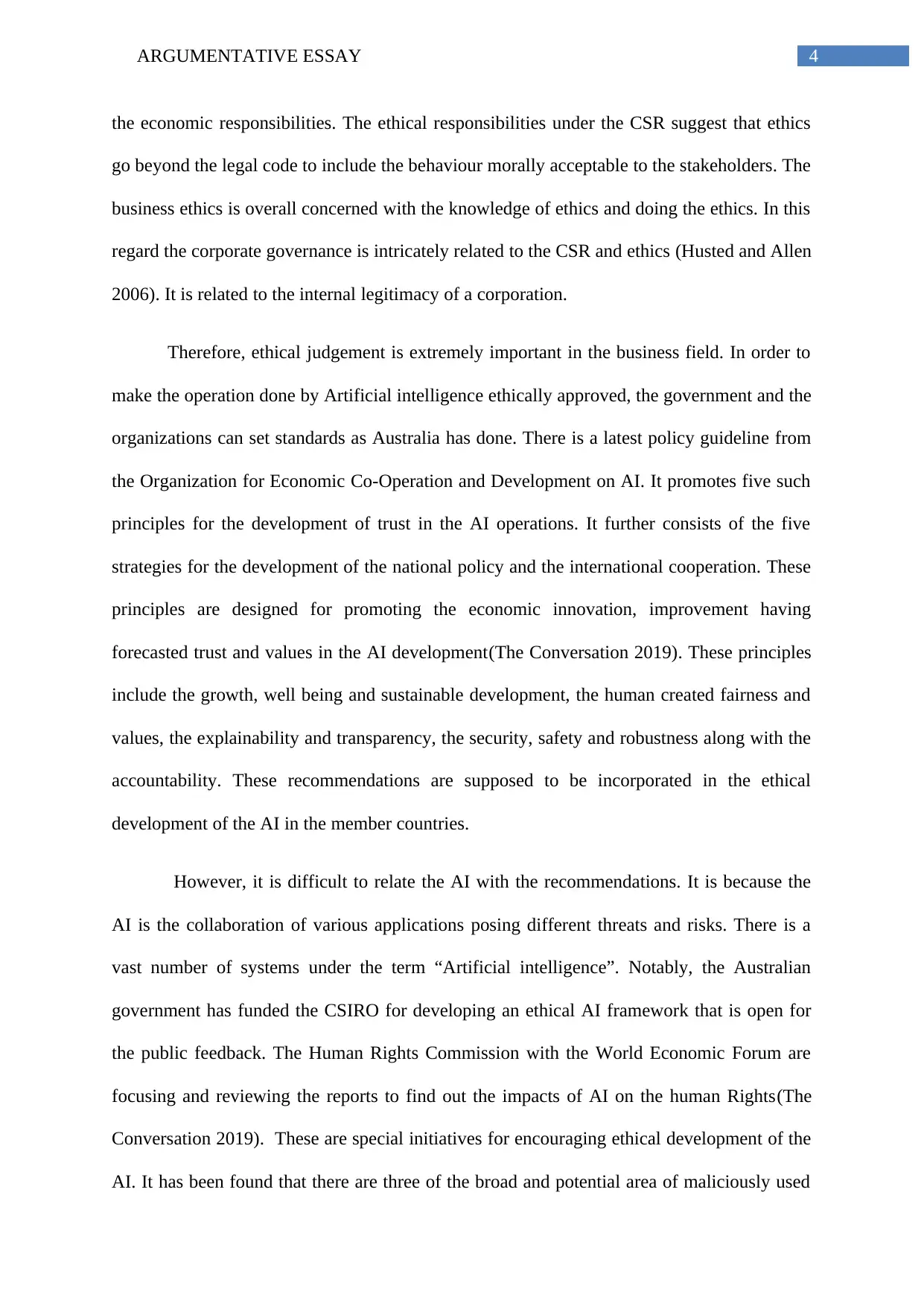
4ARGUMENTATIVE ESSAY
the economic responsibilities. The ethical responsibilities under the CSR suggest that ethics
go beyond the legal code to include the behaviour morally acceptable to the stakeholders. The
business ethics is overall concerned with the knowledge of ethics and doing the ethics. In this
regard the corporate governance is intricately related to the CSR and ethics (Husted and Allen
2006). It is related to the internal legitimacy of a corporation.
Therefore, ethical judgement is extremely important in the business field. In order to
make the operation done by Artificial intelligence ethically approved, the government and the
organizations can set standards as Australia has done. There is a latest policy guideline from
the Organization for Economic Co-Operation and Development on AI. It promotes five such
principles for the development of trust in the AI operations. It further consists of the five
strategies for the development of the national policy and the international cooperation. These
principles are designed for promoting the economic innovation, improvement having
forecasted trust and values in the AI development(The Conversation 2019). These principles
include the growth, well being and sustainable development, the human created fairness and
values, the explainability and transparency, the security, safety and robustness along with the
accountability. These recommendations are supposed to be incorporated in the ethical
development of the AI in the member countries.
However, it is difficult to relate the AI with the recommendations. It is because the
AI is the collaboration of various applications posing different threats and risks. There is a
vast number of systems under the term “Artificial intelligence”. Notably, the Australian
government has funded the CSIRO for developing an ethical AI framework that is open for
the public feedback. The Human Rights Commission with the World Economic Forum are
focusing and reviewing the reports to find out the impacts of AI on the human Rights(The
Conversation 2019). These are special initiatives for encouraging ethical development of the
AI. It has been found that there are three of the broad and potential area of maliciously used
the economic responsibilities. The ethical responsibilities under the CSR suggest that ethics
go beyond the legal code to include the behaviour morally acceptable to the stakeholders. The
business ethics is overall concerned with the knowledge of ethics and doing the ethics. In this
regard the corporate governance is intricately related to the CSR and ethics (Husted and Allen
2006). It is related to the internal legitimacy of a corporation.
Therefore, ethical judgement is extremely important in the business field. In order to
make the operation done by Artificial intelligence ethically approved, the government and the
organizations can set standards as Australia has done. There is a latest policy guideline from
the Organization for Economic Co-Operation and Development on AI. It promotes five such
principles for the development of trust in the AI operations. It further consists of the five
strategies for the development of the national policy and the international cooperation. These
principles are designed for promoting the economic innovation, improvement having
forecasted trust and values in the AI development(The Conversation 2019). These principles
include the growth, well being and sustainable development, the human created fairness and
values, the explainability and transparency, the security, safety and robustness along with the
accountability. These recommendations are supposed to be incorporated in the ethical
development of the AI in the member countries.
However, it is difficult to relate the AI with the recommendations. It is because the
AI is the collaboration of various applications posing different threats and risks. There is a
vast number of systems under the term “Artificial intelligence”. Notably, the Australian
government has funded the CSIRO for developing an ethical AI framework that is open for
the public feedback. The Human Rights Commission with the World Economic Forum are
focusing and reviewing the reports to find out the impacts of AI on the human Rights(The
Conversation 2019). These are special initiatives for encouraging ethical development of the
AI. It has been found that there are three of the broad and potential area of maliciously used
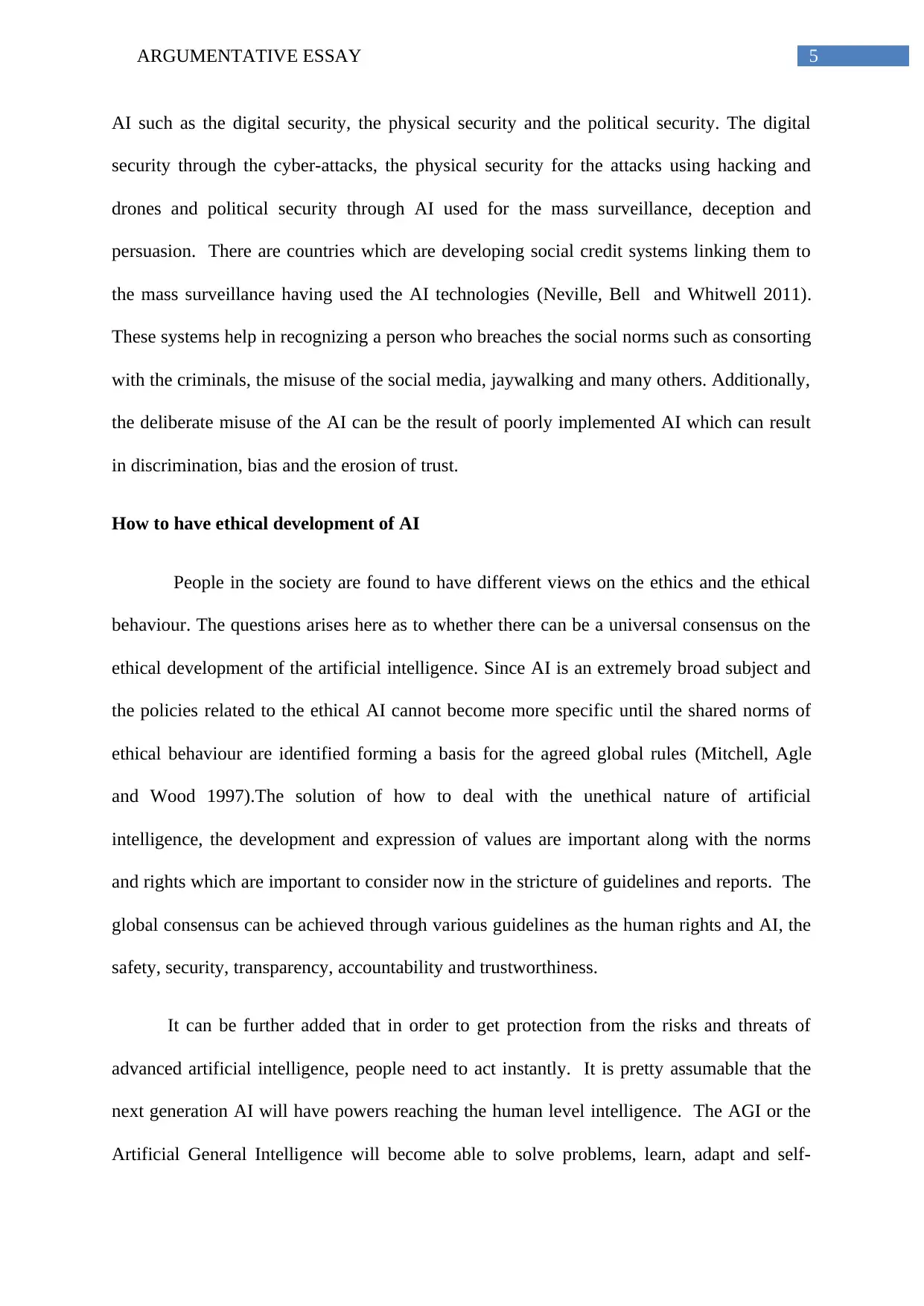
5ARGUMENTATIVE ESSAY
AI such as the digital security, the physical security and the political security. The digital
security through the cyber-attacks, the physical security for the attacks using hacking and
drones and political security through AI used for the mass surveillance, deception and
persuasion. There are countries which are developing social credit systems linking them to
the mass surveillance having used the AI technologies (Neville, Bell and Whitwell 2011).
These systems help in recognizing a person who breaches the social norms such as consorting
with the criminals, the misuse of the social media, jaywalking and many others. Additionally,
the deliberate misuse of the AI can be the result of poorly implemented AI which can result
in discrimination, bias and the erosion of trust.
How to have ethical development of AI
People in the society are found to have different views on the ethics and the ethical
behaviour. The questions arises here as to whether there can be a universal consensus on the
ethical development of the artificial intelligence. Since AI is an extremely broad subject and
the policies related to the ethical AI cannot become more specific until the shared norms of
ethical behaviour are identified forming a basis for the agreed global rules (Mitchell, Agle
and Wood 1997).The solution of how to deal with the unethical nature of artificial
intelligence, the development and expression of values are important along with the norms
and rights which are important to consider now in the stricture of guidelines and reports. The
global consensus can be achieved through various guidelines as the human rights and AI, the
safety, security, transparency, accountability and trustworthiness.
It can be further added that in order to get protection from the risks and threats of
advanced artificial intelligence, people need to act instantly. It is pretty assumable that the
next generation AI will have powers reaching the human level intelligence. The AGI or the
Artificial General Intelligence will become able to solve problems, learn, adapt and self-
AI such as the digital security, the physical security and the political security. The digital
security through the cyber-attacks, the physical security for the attacks using hacking and
drones and political security through AI used for the mass surveillance, deception and
persuasion. There are countries which are developing social credit systems linking them to
the mass surveillance having used the AI technologies (Neville, Bell and Whitwell 2011).
These systems help in recognizing a person who breaches the social norms such as consorting
with the criminals, the misuse of the social media, jaywalking and many others. Additionally,
the deliberate misuse of the AI can be the result of poorly implemented AI which can result
in discrimination, bias and the erosion of trust.
How to have ethical development of AI
People in the society are found to have different views on the ethics and the ethical
behaviour. The questions arises here as to whether there can be a universal consensus on the
ethical development of the artificial intelligence. Since AI is an extremely broad subject and
the policies related to the ethical AI cannot become more specific until the shared norms of
ethical behaviour are identified forming a basis for the agreed global rules (Mitchell, Agle
and Wood 1997).The solution of how to deal with the unethical nature of artificial
intelligence, the development and expression of values are important along with the norms
and rights which are important to consider now in the stricture of guidelines and reports. The
global consensus can be achieved through various guidelines as the human rights and AI, the
safety, security, transparency, accountability and trustworthiness.
It can be further added that in order to get protection from the risks and threats of
advanced artificial intelligence, people need to act instantly. It is pretty assumable that the
next generation AI will have powers reaching the human level intelligence. The AGI or the
Artificial General Intelligence will become able to solve problems, learn, adapt and self-
⊘ This is a preview!⊘
Do you want full access?
Subscribe today to unlock all pages.

Trusted by 1+ million students worldwide
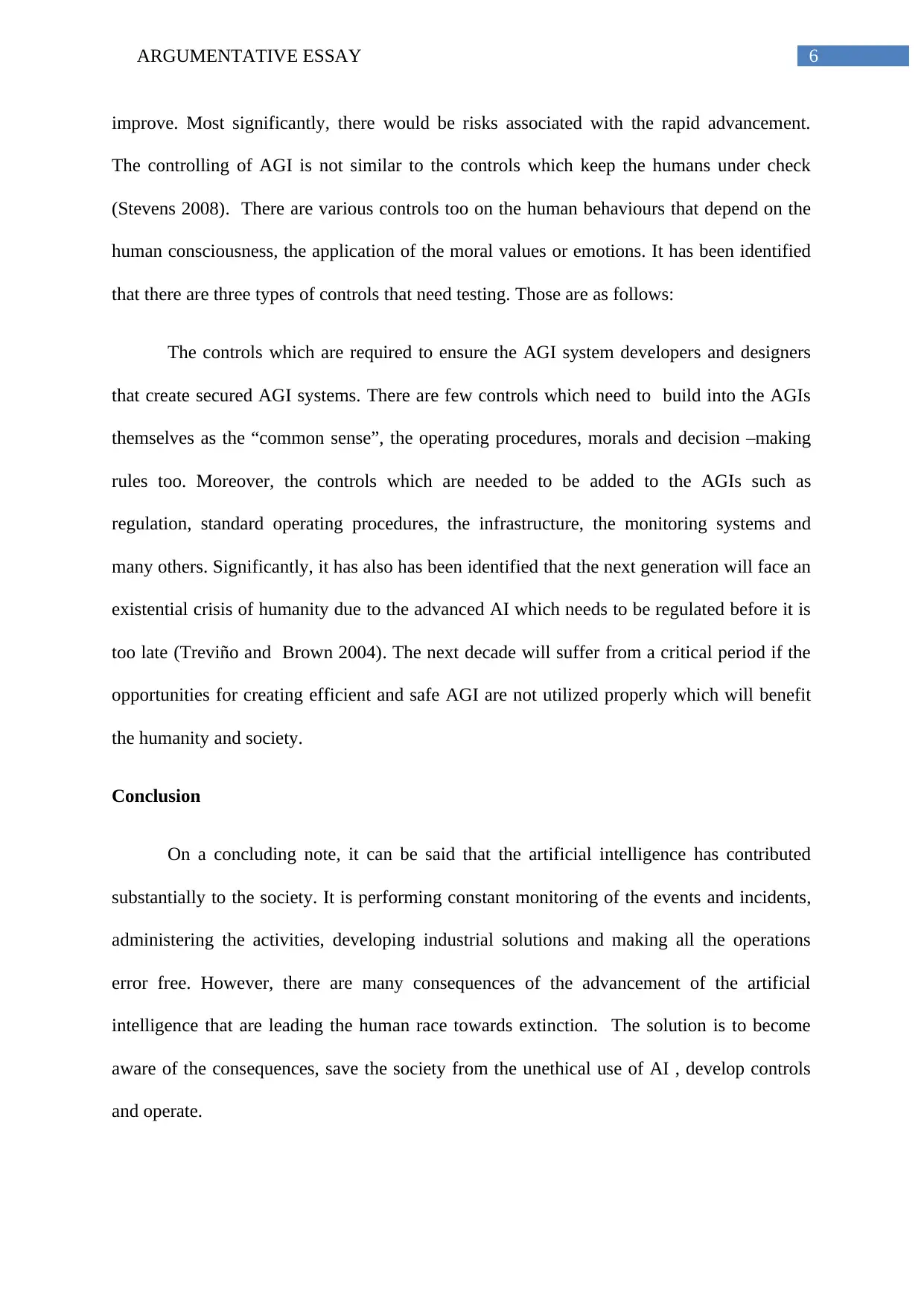
6ARGUMENTATIVE ESSAY
improve. Most significantly, there would be risks associated with the rapid advancement.
The controlling of AGI is not similar to the controls which keep the humans under check
(Stevens 2008). There are various controls too on the human behaviours that depend on the
human consciousness, the application of the moral values or emotions. It has been identified
that there are three types of controls that need testing. Those are as follows:
The controls which are required to ensure the AGI system developers and designers
that create secured AGI systems. There are few controls which need to build into the AGIs
themselves as the “common sense”, the operating procedures, morals and decision –making
rules too. Moreover, the controls which are needed to be added to the AGIs such as
regulation, standard operating procedures, the infrastructure, the monitoring systems and
many others. Significantly, it has also has been identified that the next generation will face an
existential crisis of humanity due to the advanced AI which needs to be regulated before it is
too late (Treviño and Brown 2004). The next decade will suffer from a critical period if the
opportunities for creating efficient and safe AGI are not utilized properly which will benefit
the humanity and society.
Conclusion
On a concluding note, it can be said that the artificial intelligence has contributed
substantially to the society. It is performing constant monitoring of the events and incidents,
administering the activities, developing industrial solutions and making all the operations
error free. However, there are many consequences of the advancement of the artificial
intelligence that are leading the human race towards extinction. The solution is to become
aware of the consequences, save the society from the unethical use of AI , develop controls
and operate.
improve. Most significantly, there would be risks associated with the rapid advancement.
The controlling of AGI is not similar to the controls which keep the humans under check
(Stevens 2008). There are various controls too on the human behaviours that depend on the
human consciousness, the application of the moral values or emotions. It has been identified
that there are three types of controls that need testing. Those are as follows:
The controls which are required to ensure the AGI system developers and designers
that create secured AGI systems. There are few controls which need to build into the AGIs
themselves as the “common sense”, the operating procedures, morals and decision –making
rules too. Moreover, the controls which are needed to be added to the AGIs such as
regulation, standard operating procedures, the infrastructure, the monitoring systems and
many others. Significantly, it has also has been identified that the next generation will face an
existential crisis of humanity due to the advanced AI which needs to be regulated before it is
too late (Treviño and Brown 2004). The next decade will suffer from a critical period if the
opportunities for creating efficient and safe AGI are not utilized properly which will benefit
the humanity and society.
Conclusion
On a concluding note, it can be said that the artificial intelligence has contributed
substantially to the society. It is performing constant monitoring of the events and incidents,
administering the activities, developing industrial solutions and making all the operations
error free. However, there are many consequences of the advancement of the artificial
intelligence that are leading the human race towards extinction. The solution is to become
aware of the consequences, save the society from the unethical use of AI , develop controls
and operate.
Paraphrase This Document
Need a fresh take? Get an instant paraphrase of this document with our AI Paraphraser
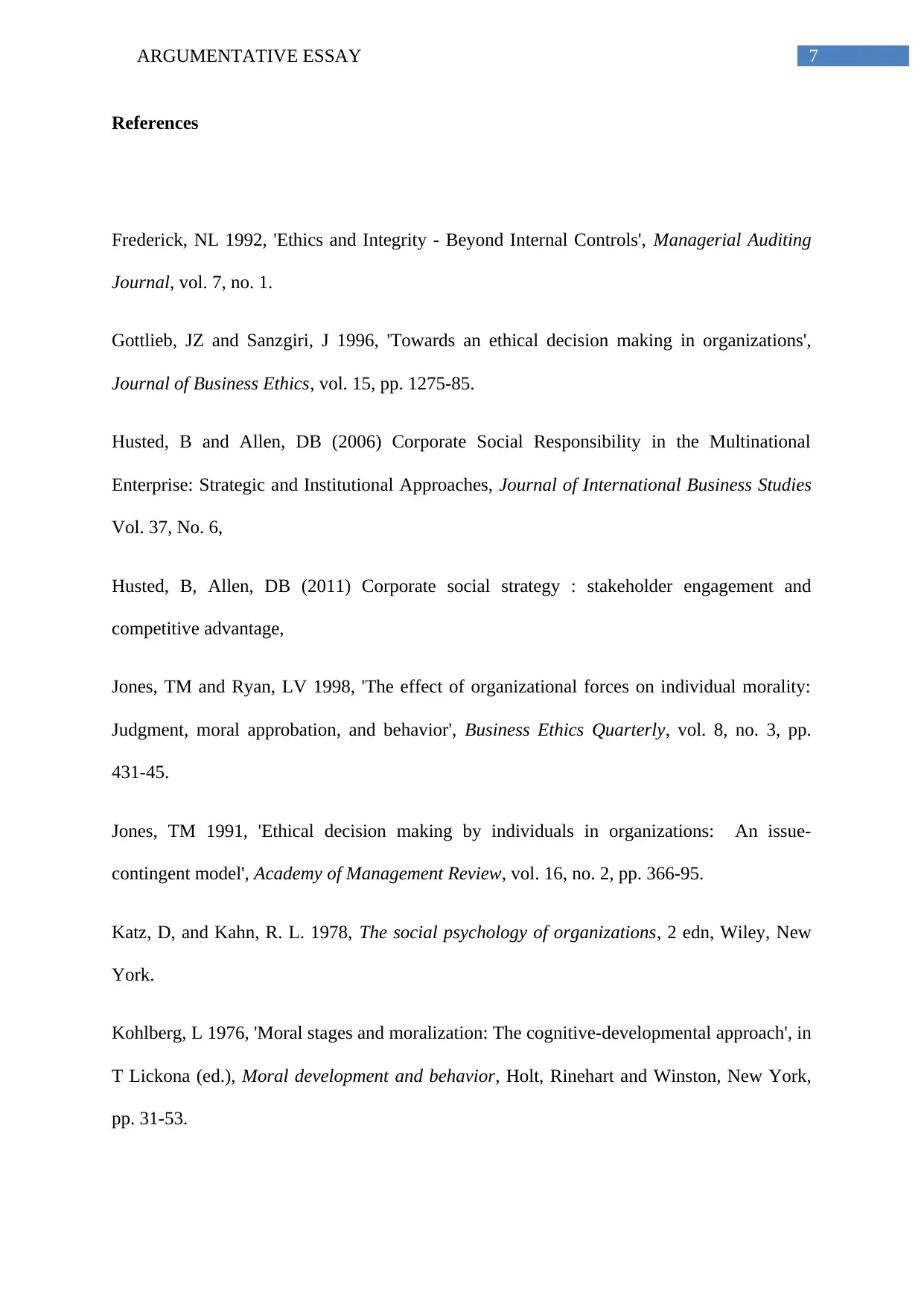
7ARGUMENTATIVE ESSAY
References
Frederick, NL 1992, 'Ethics and Integrity - Beyond Internal Controls', Managerial Auditing
Journal, vol. 7, no. 1.
Gottlieb, JZ and Sanzgiri, J 1996, 'Towards an ethical decision making in organizations',
Journal of Business Ethics, vol. 15, pp. 1275-85.
Husted, B and Allen, DB (2006) Corporate Social Responsibility in the Multinational
Enterprise: Strategic and Institutional Approaches, Journal of International Business Studies
Vol. 37, No. 6,
Husted, B, Allen, DB (2011) Corporate social strategy : stakeholder engagement and
competitive advantage,
Jones, TM and Ryan, LV 1998, 'The effect of organizational forces on individual morality:
Judgment, moral approbation, and behavior', Business Ethics Quarterly, vol. 8, no. 3, pp.
431-45.
Jones, TM 1991, 'Ethical decision making by individuals in organizations: An issue-
contingent model', Academy of Management Review, vol. 16, no. 2, pp. 366-95.
Katz, D, and Kahn, R. L. 1978, The social psychology of organizations, 2 edn, Wiley, New
York.
Kohlberg, L 1976, 'Moral stages and moralization: The cognitive-developmental approach', in
T Lickona (ed.), Moral development and behavior, Holt, Rinehart and Winston, New York,
pp. 31-53.
References
Frederick, NL 1992, 'Ethics and Integrity - Beyond Internal Controls', Managerial Auditing
Journal, vol. 7, no. 1.
Gottlieb, JZ and Sanzgiri, J 1996, 'Towards an ethical decision making in organizations',
Journal of Business Ethics, vol. 15, pp. 1275-85.
Husted, B and Allen, DB (2006) Corporate Social Responsibility in the Multinational
Enterprise: Strategic and Institutional Approaches, Journal of International Business Studies
Vol. 37, No. 6,
Husted, B, Allen, DB (2011) Corporate social strategy : stakeholder engagement and
competitive advantage,
Jones, TM and Ryan, LV 1998, 'The effect of organizational forces on individual morality:
Judgment, moral approbation, and behavior', Business Ethics Quarterly, vol. 8, no. 3, pp.
431-45.
Jones, TM 1991, 'Ethical decision making by individuals in organizations: An issue-
contingent model', Academy of Management Review, vol. 16, no. 2, pp. 366-95.
Katz, D, and Kahn, R. L. 1978, The social psychology of organizations, 2 edn, Wiley, New
York.
Kohlberg, L 1976, 'Moral stages and moralization: The cognitive-developmental approach', in
T Lickona (ed.), Moral development and behavior, Holt, Rinehart and Winston, New York,
pp. 31-53.
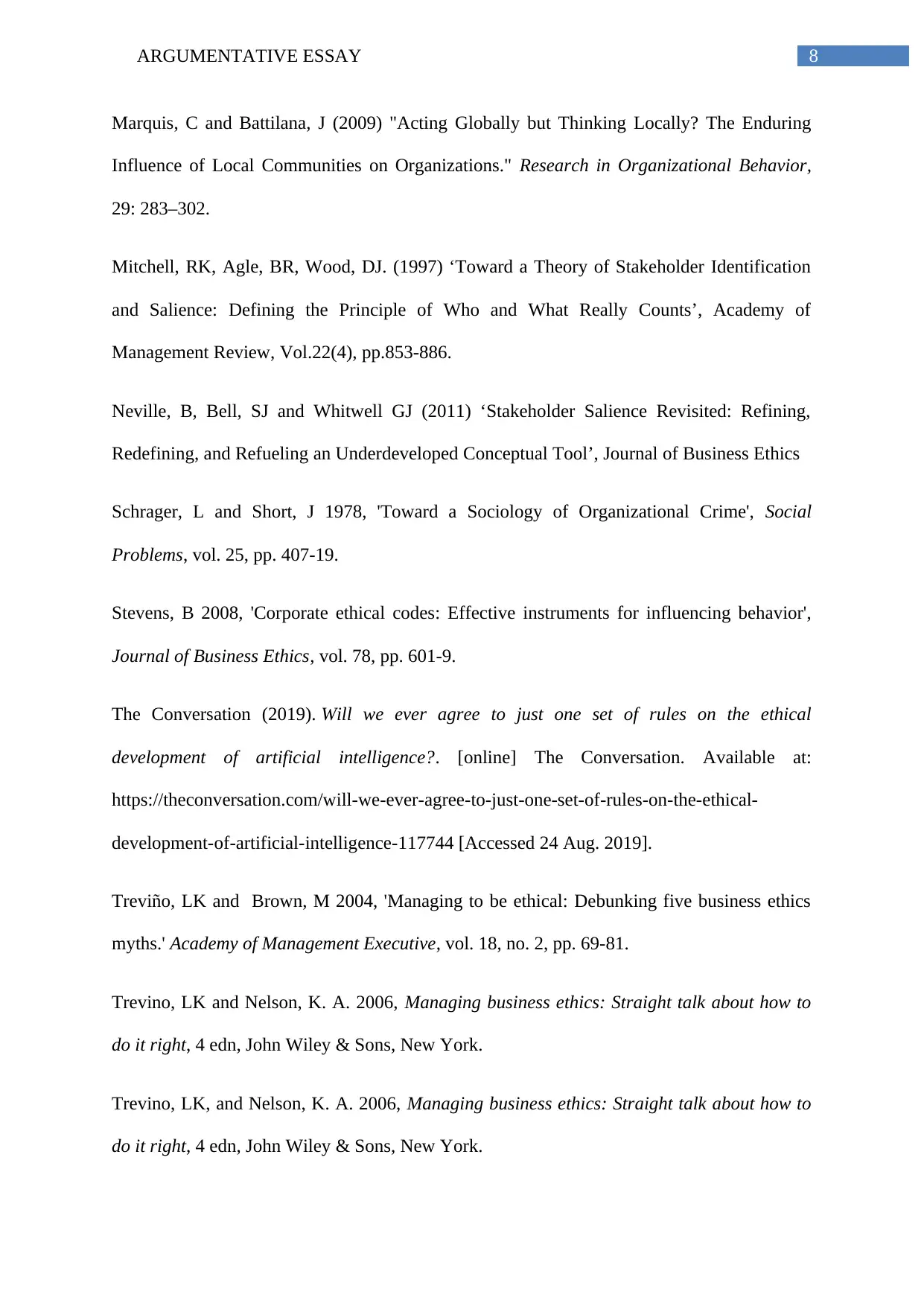
8ARGUMENTATIVE ESSAY
Marquis, C and Battilana, J (2009) "Acting Globally but Thinking Locally? The Enduring
Influence of Local Communities on Organizations." Research in Organizational Behavior,
29: 283–302.
Mitchell, RK, Agle, BR, Wood, DJ. (1997) ‘Toward a Theory of Stakeholder Identification
and Salience: Defining the Principle of Who and What Really Counts’, Academy of
Management Review, Vol.22(4), pp.853-886.
Neville, B, Bell, SJ and Whitwell GJ (2011) ‘Stakeholder Salience Revisited: Refining,
Redefining, and Refueling an Underdeveloped Conceptual Tool’, Journal of Business Ethics
Schrager, L and Short, J 1978, 'Toward a Sociology of Organizational Crime', Social
Problems, vol. 25, pp. 407-19.
Stevens, B 2008, 'Corporate ethical codes: Effective instruments for influencing behavior',
Journal of Business Ethics, vol. 78, pp. 601-9.
The Conversation (2019). Will we ever agree to just one set of rules on the ethical
development of artificial intelligence?. [online] The Conversation. Available at:
https://theconversation.com/will-we-ever-agree-to-just-one-set-of-rules-on-the-ethical-
development-of-artificial-intelligence-117744 [Accessed 24 Aug. 2019].
Treviño, LK and Brown, M 2004, 'Managing to be ethical: Debunking five business ethics
myths.' Academy of Management Executive, vol. 18, no. 2, pp. 69-81.
Trevino, LK and Nelson, K. A. 2006, Managing business ethics: Straight talk about how to
do it right, 4 edn, John Wiley & Sons, New York.
Trevino, LK, and Nelson, K. A. 2006, Managing business ethics: Straight talk about how to
do it right, 4 edn, John Wiley & Sons, New York.
Marquis, C and Battilana, J (2009) "Acting Globally but Thinking Locally? The Enduring
Influence of Local Communities on Organizations." Research in Organizational Behavior,
29: 283–302.
Mitchell, RK, Agle, BR, Wood, DJ. (1997) ‘Toward a Theory of Stakeholder Identification
and Salience: Defining the Principle of Who and What Really Counts’, Academy of
Management Review, Vol.22(4), pp.853-886.
Neville, B, Bell, SJ and Whitwell GJ (2011) ‘Stakeholder Salience Revisited: Refining,
Redefining, and Refueling an Underdeveloped Conceptual Tool’, Journal of Business Ethics
Schrager, L and Short, J 1978, 'Toward a Sociology of Organizational Crime', Social
Problems, vol. 25, pp. 407-19.
Stevens, B 2008, 'Corporate ethical codes: Effective instruments for influencing behavior',
Journal of Business Ethics, vol. 78, pp. 601-9.
The Conversation (2019). Will we ever agree to just one set of rules on the ethical
development of artificial intelligence?. [online] The Conversation. Available at:
https://theconversation.com/will-we-ever-agree-to-just-one-set-of-rules-on-the-ethical-
development-of-artificial-intelligence-117744 [Accessed 24 Aug. 2019].
Treviño, LK and Brown, M 2004, 'Managing to be ethical: Debunking five business ethics
myths.' Academy of Management Executive, vol. 18, no. 2, pp. 69-81.
Trevino, LK and Nelson, K. A. 2006, Managing business ethics: Straight talk about how to
do it right, 4 edn, John Wiley & Sons, New York.
Trevino, LK, and Nelson, K. A. 2006, Managing business ethics: Straight talk about how to
do it right, 4 edn, John Wiley & Sons, New York.
⊘ This is a preview!⊘
Do you want full access?
Subscribe today to unlock all pages.

Trusted by 1+ million students worldwide

9ARGUMENTATIVE ESSAY
Trevino, LK, Hartman, L.P., and Brown, M 2000, 'Moral person and moral manager: How
executives develop a reputation for ethical leadership', California Management Review, vol.
42, no. 4, pp. 128-42.
Trevino, LK, Hartman, L.P., and Brown, M 2000, 'Moral person and moral manager: How
executives develop a reputation for ethical leadership', California Management Review, vol.
42, no. 4, pp. 128-42.
1 out of 10
Related Documents
Your All-in-One AI-Powered Toolkit for Academic Success.
+13062052269
info@desklib.com
Available 24*7 on WhatsApp / Email
![[object Object]](/_next/static/media/star-bottom.7253800d.svg)
Unlock your academic potential
Copyright © 2020–2026 A2Z Services. All Rights Reserved. Developed and managed by ZUCOL.





